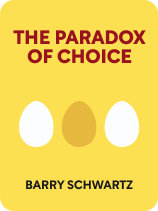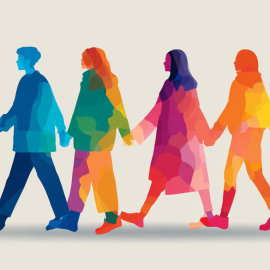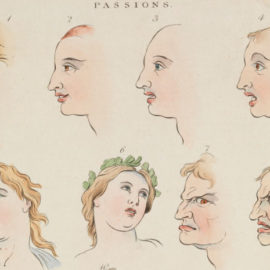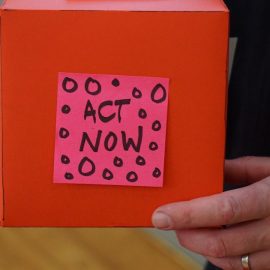

This article is an excerpt from the Shortform book guide to "The Paradox of Choice" by Barry Schwartz. Shortform has the world's best summaries and analyses of books you should be reading.
Like this article? Sign up for a free trial here .
What are the biggest decision-making barriers? Why does expanded choice make decisions even more difficult?
In his book The Paradox of Choice, Barry Schwartz asserts that expanded choice comes with four distinct pitfalls: missed opportunities, regret, disappointment, and unfavorable comparison. These decision-making barriers can have many side effects, such as decision paralysis, anxiety, and depression.
Here’s a breakdown of the four decision-making barriers that come with expanded choice.
1. Missed Opportunities
The first decision-making barrier that Schwartz discusses is opportunity cost. Opportunity costs always come into play when we make a choice: When we settle on one option, we forgo the potential benefits of the other options. While it is important to consider the pros and cons of your options when making a deliberate choice, obsessing over opportunity costs can make you dissatisfied with the choice you do make.
People who stress over opportunity costs might be dissatisfied in the end because they worry that they haven’t made the objectively correct decision, or that there could have been a perfect option they haven’t considered. Schwartz argues, however, that opportunity costs are entirely subjective. There is no objectively correct decision, just the right decision for the chooser.
(Shortform note: Many decisions do have objectively positive or negative outcomes—for instance, if you choose to save money by eliminating doctor visits, you’ll end up with poor health. While Schwartz’s argument is salient in that we make many decisions based on feelings, which we can overemphasize, it’s important to be more aware of objective outcomes when making choices in areas like health and finances.)
2. Regret
Expanded choice can lead us to regret our choices. Schwartz notes three factors that cause regret:
- Omission bias: When reflecting on the recent past, we regret choices we made instead of those we failed to make. The opposite is also true: When reflecting on the distant past, we tend to regret choices we failed to make instead of those we made.
- Nearness effect: If a choice nearly works out, we feel bad that it didn’t.
- Responsibility: We only regret choices we feel personally responsible for.
| Maximizing and Regret Studies have shown that regret is one of the key negative impacts of maximizing. One study even suggested that quality of life for maximizers is affected only when the maximizer feels regret. Because maximizers don’t have consistent standards, and instead constantly consider what better options there are, they have the potential to regret any decision that they make. Thus maximizers can feel regret constantly. This can have many negative effects on quality of life, because significant regret can harm mental health, making you feel anxious, depressed, and dissatisfied. Therefore, learning to be a satisficer, can lessen regret and improve life satisfaction. If you’re a maximizer and struggle with decision regret, try taking steps to satisfice, like setting standards, making firm decisions, and accepting options that are “good enough” instead of perfect. |
To make matters worse, we’re able to imagine hypothetical scenarios, called counterfactuals, that prompt regret. For example, we imagine how past events might have gone differently, or what our lives would be like had we made different choices.
Schwartz identifies two kinds of counterfactuals: upward and downward. The kind that brings us regret are upward counterfactuals: We imagine how something in our life could be better, and regret that that’s not the case. Using downward counterfactuals, however, we imagine how things could be worse. Schwartz writes that downward counterfactuals have the potential to reduce regret, and that those who struggle with excessive regret could benefit by practicing them.
(Shortform note: A 2017 study showed a correlation between upward counterfactuals and depression. It’s unclear whether depression causes people to think of upward counterfactuals (how they could have been better off) or vice versa, but this data backs up Schwartz’s idea that frequent counterfactual thinking leads to unhappiness and regret.)
Expanded choice, and the maximizing tendency it encourages, amplifies regret over decisions. Aiming to choose only “the best” will create regret whenever a chosen option isn’t perfect, which is almost all of the time.
3. Disappointment
Schwartz explains that even when we make good choices, we often end up disappointed in the long run because of hedonic adaptation: When we get used to things that give us pleasure, they lose their novelty and we begin to take them for granted. To counteract this, many of us get caught on a “hedonic treadmill,” meaning that we constantly chase after pleasurable experiences.
| The Link Between Shopping and Unhappiness An example of the hedonic treadmill that most of us have experienced is the desire to buy more and more things. Buying a coveted item, or even a random product that piques your interest at the right moment, makes you feel good in the moment, yet hedonic adaptation usually kicks in pretty quickly. It can be easy to get trapped in a pattern of purchasing random products to get a regular little jolt of pleasure. In an article in The Atlantic about how unfettered shopping can damage supply chains, Amanda Mull illustrates the futility of buying things to create happiness. The author comments that feeling bad makes people buy things to feel better. Yet studies have shown that accumulating material possessions makes you less happy. Shopping is just one example of how hopping on a hedonic treadmill can make you less satisfied. |
Expanded choice makes our relationship to hedonic adaptation more difficult, because we have more opportunities to be disappointed by our choices. Our decisions are also more difficult and time-consuming when we have more options to choose from, meaning that our disappointment can be heightened when we don’t feel as good about a choice as we’d expect. If we spend a lot of time on a choice, we hope it will be satisfying, therefore it can feel depleting when we’re less happy than expected.
This problem is heightened for maximizers, since they put more weight on each of their decisions. Because maximizers strive to make perfect decisions, being dissatisfied with a decision will make them feel worse than a satisficer who is occasionally dissatisfied feels.
4. Comparison
Schwartz notes that one reason we may feel regret or disappointment in our choices is that we compare them with others’ choices to gauge whether we’re choosing well.
Social comparison—comparing ourselves to others—affects decision-making the most in market democracies, according to Schwartz. He notes that a motivating factor behind social comparison is the desire for status. Achieving status, however, is difficult in a society of expanded choice: Everyone has more ways to accrue status, so it’s harder to get ahead.
A complicating factor is that society encourages us to compete for scarce resources. Status motivates us to compare ourselves and our choices to others’, yet scarcity means we sometimes fall short, which makes this pursuit profoundly unsatisfying. While social comparison and the drive to accrue status cause challenges for everyone, Schwartz notes that, once again, maximizers suffer the most acutely because of their drive for the best.
(Shortform note: Social media is one area where social comparison is especially notable. Because people tend to post idealized images of themselves on social media, users make frequent upward comparisons. When subjected to a constant stream of images that cause upward social comparison, people may experience depression, lower self-esteem, and negative body image. These results are particularly strong for those who are pessimistic.)

———End of Preview———
Like what you just read? Read the rest of the world's best book summary and analysis of Barry Schwartz's "The Paradox of Choice" at Shortform .
Here's what you'll find in our full The Paradox of Choice summary :
- Why the more choices we have, the more stressed and indecisive we feel
- How to better navigate our choices, from groceries to health insurance
- Whether it's better to seek the best or accept "good enough"






